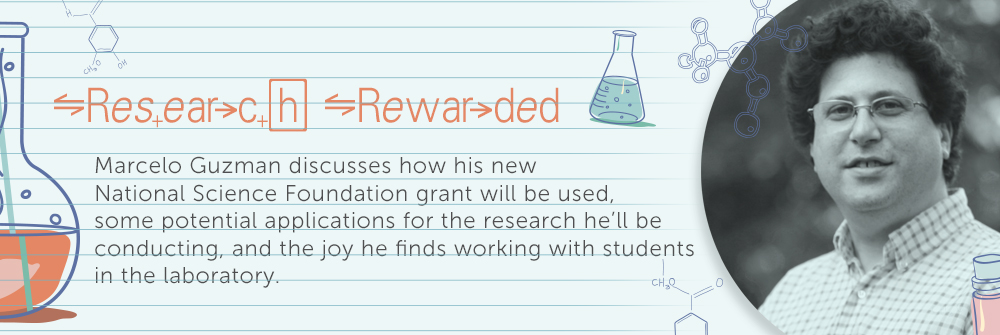
By Sarah Geegan
UK chemistry professor Marcelo Guzman was recently awarded the prestigious, National Science Foundation (NSF) Career Award, a five-year grant for his research, education, and outreach efforts in the field of environmental chemistry.
The $525,000 grant will allow Guzman to develop the first atmospheric chemistry research and education program in Kentucky. The funding will also support students in various stages of their academic careers: undergraduate, graduate and K-12.
Guzman's work with environmental chemistry focuses on the interaction of light with organic compounds present in low water activity environments such as the atmospheric aerosol, clouds and fogs.
He said his inherent curiosity led him to this field.
"Imagine you're in a plane, and you reach the altitude of the clouds," Guzman said. "You see the clouds. Have you ever wondered what are they made of? Water vapor and other components, including both organic and inorganic molecules and ions. And then you may wonder would they react, and if so how? What chemical reactions would they undergo? What are the possibilities? Those very basic questions are significant to understand the fate of naturally produced organic molecules and pollutants in the environment."
Guzman said that his research has very broad applications, but is rooted in gaining a fundamental understanding of processes occurring in the environment.
>> Listen to Professor Guzman discuss his research and how the grant will be used in the podcast "Research Rewarded: Marcelo Guzman".
"We will address important questions that have a direct impact on problems such as climate, visibility reduction, and public health," he said. "Those are applications that many times come after a basic understanding of the problems is gained."
One of the most important things he does is integrate research and education.
"A primary goal of the program is to fund basic sciences, and to educate students in environmental chemistry," Guzman said. "The project will provide interdisciplinary training to graduate students using advanced instrumentation, while helping them to think critically in order to solve complex problems.“
The NSF Career Award will also allow Guzman to continue his mentoring relationship with the local Lafayette High School Pre-Engineering Program and to collaborate with the UK Appalachian Center.
“I think that sharing my knowledge with the students is a great way to educate the next generation of scientists. The research requires group collaboration. From the beginning of an experiment and the analysis of the first results, I try to help the students to interpret the information and brainstorm together about the meaning, its impact, and prepare for the next phase of research.” Guzman said. "The project provides a mixture of entertaining, fun, challenging, and creative work. I try to project that excitement onto the students doing research in the lab, and assist them in being creative."
He said that he finds the opportunity very exciting.
"I look forward to working with the students and guiding them in the research," Guzman said. "That's very powerful. To me, that's one of the most important outcomes -- teaching students to think profoundly and to solve problems."

